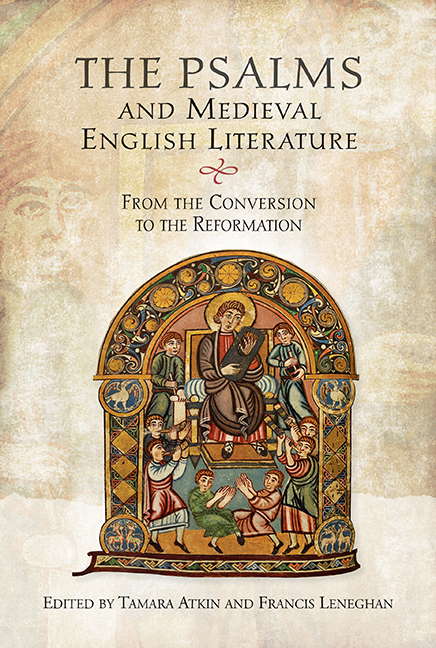Introduction A Case Study of Psalm 50.13 in Old and Middle English
Published online by Cambridge University Press: 09 May 2017
Summary
This boke of all haly writ is mast oysed [used] in halykyrke seruys, forthi that in it is perfeccioun of dyuyne pagyne [pages], for it contenys all that other bokes draghes langly, that is, the lare [teaching] of the ald testament and of the new. Thare in is discryued the medes [rewards] of goed men, the pynes of ill men, the disciplyne of penaunce, the waxynge in rightwise lif, the perfeccioun of haly men, the whilk [which] passis til heuen, the lyf of actyf men, the meditacioun of contemplatifs, and the ioy of contemplacioun, the heghest that may be in man lifand [living] in body and feland [feeling].
(Prologue to Richard Rolle's English Psalter, c. 1340)The Psalter or Book of Psalms, originating in the traditions of Jewish communities of Syria, Egypt and Babylon in the eleventh to fifth centuries BC and known in Hebrew as Tehillim[‘songs of praise’], was to become the foundation of medieval Christian thought and practice. Central to the Psalter's enduring appeal is its brevity: as the fourteenth-century English hermit Richard Rolle observes, it condenses the essential ‘lare’ [‘teaching’] of the entire Bible into a series of short poems which could be learnt by heart.4As such, the Psalter became the most highly prized, frequently copied and widely used of all books of the Bible; its ancient songs of individual and communal lament and praise, traditionally attributed to King David, were translated from their original Hebrew first into Greek and Latin, and thence into many European vernaculars. Finding expression both in prose and verse, psalm glosses, translations, commentaries and adaptations were used for both private and communal worship by generations of medieval European men and women. The Church Fathers provided educated medieval Christians with the tools to understand these often enigmatic and complex texts both literally and allegorically: for example, as a bridge between the Old and New Testaments; as prophecies; as expressions of the hopes and fears of David, Christ and the reader; and as a space where the voices of David, Christ, the Church and the individual Christian could could mingle. So Augustine of Hippo, in his commentary on Psalm 85, writes:
Orat pro nobis, ut sacerdos noster; orat in nobis, ut caput nostrum, oratur a nobis, ut Deus noster.
- Type
- Chapter
- Information
- The Psalms and Medieval English LiteratureFrom the Conversion to the Reformation, pp. 1 - 34Publisher: Boydell & BrewerPrint publication year: 2017

